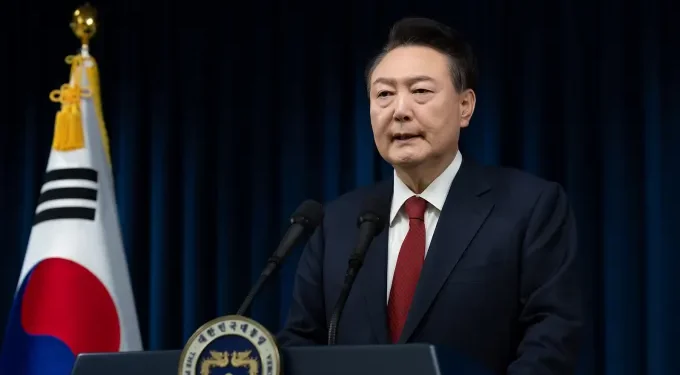South Korea’s political crisis deepened on Monday as authorities imposed an overseas travel ban on President Yoon Suk Yeol amid an expanding investigation into allegations of insurrection. The move follows Yoon’s failed attempt to impose martial law, a decision that has left his leadership teetering on the brink.
Travel Ban and Calls for Resignation
The Corruption Investigation Office confirmed the travel ban on Yoon as prosecutors explore potential charges related to his controversial actions last week. Despite surviving an impeachment vote in the opposition-dominated parliament on Saturday, Yoon faces mounting calls for his resignation.
His political party has urged that he step down immediately, arguing that the president’s continued presence in office poses a “grave danger” to the nation’s stability.
Martial Law Declaration Sparks National Outrage
The crisis began on Tuesday evening when Yoon made a shocking televised declaration of martial law. The order was swiftly met with widespread protests across South Korea, a country still haunted by the memories of authoritarian rule during its decades-long struggle for democracy.
Thousands of demonstrators gathered outside government buildings, demanding Yoon’s resignation. Parliamentarians also acted swiftly, overriding the decree in a dramatic late-night session. Nearly 300 troops had been deployed to block lawmakers from entering the National Assembly building, but they forced their way inside and voted unanimously to annul the president’s directive.
The military emergency, which lasted only six hours, has left deep scars on the nation’s collective consciousness, with many seeing it as a stark reminder of how fragile democracy can be.
Apologies from the President and Military Leaders
President Yoon addressed the nation on Saturday, offering a brief apology for his actions. “This emergency martial law declaration stemmed from my desperation as the ultimate responsible party for state affairs,” he said during a two-minute statement. “I caused anxiety and inconvenience to South Korean citizens, and for that, I am deeply sorry.”
Meanwhile, Col. Kim Hyun-tae, commander of South Korea’s elite 707 Special Task Force, also issued a public apology for his role in executing the martial law orders. Speaking at a press briefing on Monday, Kim admitted to authorizing his troops to storm parliament and confront lawmakers.
“I ordered the deployment to the National Assembly. As the on-site commander for the 197 troops involved, I take full responsibility for these actions,” Kim said. “These troops are victims who were simply following orders. The blame lies solely with me as their commander.”
Investigation and Accountability
The scandal has triggered multiple investigations. Former Defense Minister Kim Yong-hyun, accused of exploiting military forces during the crisis, was detained by prosecutors on Sunday. Police are also probing allegations of treason against Kim and other senior officials.
One of the most shocking moments of the night involved journalist-turned-politician An Gwi-ryeong, who was seen grappling with a soldier’s firearm as lawmakers attempted to enter the blocked parliament building.
Col. Kim expressed regret for placing his soldiers in harm’s way. “If such orders had been given in combat, everyone would have died,” he said, adding that he is prepared to face any legal consequences.
Public and Political Fallout
The fallout from the crisis has severely undermined Yoon’s administration, with protests continuing across the country. Critics say the failed martial law declaration is a stark reminder of the dangers posed by unchecked executive power.
Observers now question whether Yoon can maintain his presidency or if his actions will lead to long-term political and legal repercussions.
Related Stories:
President Yoon Declared and Uplifted Martial Law In South Korea
Mass resignations follow after President Yoon declared then lifted martial law
North Korean balloon dumps rubbish on South Korea’s presidential compound
















